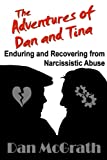
Get Help for Narcissistic Abuse Syndrome
Narcissistic Abuse Victims Syndrome or just Narcissistic Abuse Syndrome is not included in the current, official Diagnostic and Statistical Manual of Mental Disorders in the United States. The unofficial diagnoses are rather an observation, by numerous mental health professionals, of the same cluster of symptoms in people they’ve treated who were in relationships (romantic, family, friendship or professional) with suspected or diagnosed Cluster B disordered people. The cluster of common symptoms is sometimes diagnosed as Post Traumatic Stress Disorder (PTSD) or Complex Post Traumatic Stress disorder (C-PTSD). There is little to no difference between the symptoms of these conditions. The primary difference in diagnosis may come primarily from the specific cause. See more about this in “Symptoms of Narcissistic Abuse.”
Whatever you choose to call it, the aftermath of emotional abuse can be debilitating and often requires some kind of professional help to process and recover from it.
There are psychological emotional and physiological causes underlying the symptoms and there are several treatment options available.
| If you find this blog helpful, check out the reviews on the book! The Adventures of Dan and Tina - Enduring and Recovering from Narcissistic Abuse |
"Powerful. Truthful. Enlightening!" As an Amazon associate, I earn from qualifying purchases. |
Find Psychotherapy
For clinical, psychological treatment, Cognitive Behavioral Therapy (CBT) and Eye movement Desensitization and Reprocessing (EMDR) are typically recommended. Other styles of talk therapy can also be of some help processing emotions. Although our collective knowledge about narcissistic abuse is increasing rapidly, finding a mental health professional experienced in treating victims of narcissistic abuse can be challenging. Fortunately, there’s a great tool for finding the help you need.
Free PTSD Coaching App
The Veterans Administration offers resources for people suffering PTSD, including a free PTSD coaching app for your smart phone. There’s also a desktop version. The VA’s PTSD coach offers help for:
- worry or anxiety
- anger
- sadness or hopelessness
- sleep problems
- trauma reminders
- avoidance of stressful situations
- disconnection from people
- disconnection from reality
- problem solving skills
- direction in life
Personal Healing Strategies
Through my own research and trial and error, I developed several strategies to address my own (largely physical) symptoms, which I detailed in my article, “Healing Strategies After Narcissistic Abuse.”
Psychiatric Treatment
I experimented with psychiatric drugs on advice of my therapist and found some temporary use for anti-anxiety and anti-depressant medications, but would give them mixed reviews. Gabapentin (used off-label), hydroxyzine and Propranalol (off-label) are mild, non habit-forming medications that aren’t SSRIs and didn’t require ramping up or weaning off of. I found them moderately helpful for anxiety and not at all dangerous.
Other medications commonly prescribed by psychiatrists for treating symptoms of C-PTSD are:
These are heavier-duty medications that may have long-term or even permanent effect on brain chemistry, even after cessation. They may take months of gradual increasing dosages before they begin to work and may require lengthy tapering-off periods to safely stop taking them.
Not everyone responds the same way to these types of medications. For some people they may be positively life-changing, but they may make things worse for others. It can take some experimenting with different combinations and dosages to achieve the desired affect. All require a prescription.
OTC Medications
Antihistamines have been found to have a mild sedative effect that may reduce anxiety. Hydroxyzine is a prescription antihistamine sometimes prescribed for anxiety, for example, but non-prescription antihistamines can also work.
Diphenhydramine, also known by the brand name Benadryl is one such over the counter medicine that can help with anxiety and sleeplessness.
There are a number of nutrition supplements and holistic remedies that are purported to help with anxiety and depression. I wrote about my experiences with some of those in the article, “Healing Strategies After Narcissistic Abuse.”
Self-Help Books
- The Body Keeps Score: Brain, Mind and body in the Healing of Trauma
- Complex PTSD for Beginners
- Psychopath Free – Recovering from emotionally abusive relationships with narcissists, sociopaths and other toxic people.
Click Here to Help Support DanandTina.net
Don't forget to bookmark this site and subscribe to be informed when updates are posted.
What are your thoughts on this article? Please leave feedback or start a discussion in the comments section.
If you link to an article here, let me know so I can add a link back!
Permission is granted to repost any article on DanandTina.net in whole, or in part, provided that a link back to the original post on DanandTina.net is included in the reposting.

